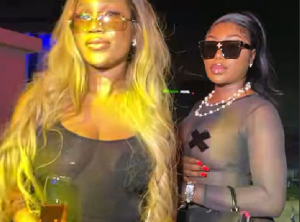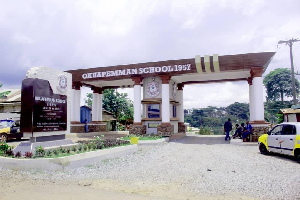- Home - News
- TWI News | TV
- Polls
- Year In Review
- News Archive
- Crime & Punishment
- Politics
- Regional
- Editorial
- Health
- Ghanaians Abroad
- Tabloid
- Africa
- Religion
- Election 2020
- Coronavirus
- News Videos | TV
- Photo Archives
- News Headlines
- Press Release
General News of Wednesday, 29 September 2010
Source: The Herald
Rawlings Knocks Out Kufuor
*While Kwame Nkrumah Floors JB Danquah, Edward Akufo Addo, Kofi Busia, Obetsebi-Lamptey & Others In BBC 50 Iconic Figures***
Ex-President John Agyekum Kufuor, an Oxford -trained lawyer, who is widely hyped in a section of the Ghanaian media as a democrat, a man of law whose presidency was the best thing that ever happened to Ghana, would have been reduced to a mere spectator had the British Broadcasting Corporation (BBC) African Service decided to award iconic figures on the continent at a ceremony.
Ironically, making the list, however, is his media-bashed predecessor, and a form four leaver from Achimota School, Flt-Lt. Jerry John Rawlings, widely described as Ghana’s version of the cannibal military dictator, Iddi Amin Dada, alongside Dr. Kwame Nkrumah, Ghana’s first president and Mr. Kofi Annan, the ex-General Secretary of the United Nations (UN).
The selection of Dr. Nkrumah and Mr. Rawlings, the two longest serving heads of state who have becomes symbols of the tyranny, abductions, tortures and murders in Ghana, according to the gospel of the New Patriotic Party (NPP) and the antecedent the United Party (UP), comes as a huge shocker to many, especially observers of Ghana’s politics.
Mr. Kufuor is not alone as Dr. J.B. Danquah, Dr. Kofi Abrefa Busia, Edward Akufo Addo, Ako Adjei and William Ofori-Atta who were compatriots of Dr. Kwame Nkrumah, but later became his bitterest enemies in the fight for Ghana’s independence, and were very instrumental in his violent overthrow in February 1966.
History teaches us that, a prophet is not recognized in his own town, but gets recognition elsewhere. Never in the history of this country has anybody been vilified, and called names like Mr. Rawlings and Dr. Nkrumah. But in a rather interesting twist, the so-called proponents of democracy and the doyens of the rule of law have collapsed before their feet.
Frank Agyekum, the Spokesperson for Mr. Kufuor has said the former president is not bothered about his failure to make the list of Africa’s most iconic figures, and that Mr. Kufuor is happy for those who made the list. But this statement surprises many as judging from the media bliss which greeted mere invitations to the Buckingham Palace by the Queen, White House and the Chatton House Award, among others.
The BBC African Service said, as part of activities to mark 50 years of Africa independence, it decided to conduct a poll and “after much heated debate,” some 50 personalities, including Ghana’s Jerry Rawlings, Kofi Annan and Dr. Kwame Nkrumah were chosen as the continent’s most iconic figures.
Mr. Kufuor’s failure to make the list comes in the wake of a similar exercise conducted last year by the prestigious Mo Ibrahim African Leadership Prize, where a whopping US$5 million was up for grab by him and any other African leader, including Thabo Mbeki (South Africa), Olusegun Obasanjo (Nigeria) and Ahmed Tejan Kabbah (Sierra Leone). Among four, Mr. Kufuor, was in the race as a darling boy of the world leaders, especially ex-President Bush of the US and the Queen of England.
But while Kwame Nkrumah and Kofi Annan, making the elite list do not surprise many with respect to the various roles they have played on the national and international scene, Mr. Rawlings’ appearance on the top 50 list of famous Africans, was unexpected, particularly because of the several negative media reports on him, his views and roles in Ghana’s politics.
His emergence on the Ghanaian political scene on May 15, 1979, as a young soldier, was hailed by all and sundry, especially the marginalized in the society. He was soon named Junior Jesus in replacement of Jerry John.
Those who lived through the time described how difficult the economic situations were at the time. One had to join long queues for many hours to purchase ordinary soap, a loaf of bread, a ball of kenkey and other basic commodities which, nowadays, are at arm’s length.
After his second coming in 1981, coming again as a military ruler, saw him storming Ghana’s cocoa growing areas to cart huge volumes of the cash-crop locked up by virtue of bad roads and collapsed bridges, to the Tema and Takoradi Habours for onward shipment abroad for foreign exchange which Ghana dearly needed .
Indeed, there are various photographs and videos of him and prominent people, including students, professors, medical doctors, farmers, teachers and chiefs, acting as “human donkeys” to haul sacks of cocoa to the nearest motorable road for the lorries to carry away to the habour.
The roads somewhat became better, and the economy improved quite significantly. However, pressure from the donor partners in America and Britain; the Bretton Woods institutions were calling, and rightly so, for an alternate style of governance- Democracy -selection of leaders through the ballot box, as opposed to military rule.
It is reported that although Mr. Rawlings was livid about the prospects of democracy in Ghana, he resigned from office as the head of the military junta to contest in the presidential elections of 1992, which he won massively against the media favoured Prof. Albert Adu Boahene.
From 1992 to 2001 when he handed over power to the New Patriotic Party, led by ex-President Kufuor, no day passed by without his name being in the pro-NPP media with headlines such as “Rawlings Is Mad,” “Ashawoba Rawlings”, “Cage Killer Rawlings,” among others.
To any casual observer, the agenda of the NPP was to reduce Mr. Rawlings to nothing. His administration was vilified and his 19 years rule was said to be the dark days of our political history; some even went to the extent of saying that Ghana went 19 years behind time.
Mr. Kufuor’s first Attorney-General and Minister of Justice, Nana Akufo Addo, who is now the Flagbearer of the NPP, soon after settling in office, established the Fast Track High Court, and notable Rawlings men Tsatsu Tsikata, Kwame Pepra, Ibrahim Adam, George Sipa Yankey, Dan Abodakpi, Ato Dadzi, Kwasi Ahwoi and Dr. Dapaah were put on trial, with some being jailed for causing financial lose to the state after Alhaji Mallam Issa of the PNC had open the lead.
Mr. Rawlings, was stripped of all privileges guaranteed him in the 1992 constitution as ex-president.
As if that was not enough, the NPP government established the National Reconciliation Commission (NRC); and the name on the name of one man, Rawlings, was on the lips of all those who appeared before the NRC. All manner of people, notably Christ Asher, Matthew Adabuga, and Captain Boakye Dzan who claimed to know Rawlings or have had personal links with him were offered plane tickets paid for from scarce state resources to testify in an exercise which ended in futility.
Journalists, whose newspapers had even collapsed or were collapsing, were in the air, traveling abroad in search of stolen monies and imaginary bribes, Mr. Rawlings received whilst in office, and stashed away in foreign account to enable them “strip Rawlings naked” but to no avail.
Perhaps, the only award he rightly deserved is the “Fifty Cent Kufuor Medals” he gave himself and others including friends, cronies, media owners, judges without citations while leaving office in 2008. Perhaps, he is also content with a Doctorate Degree in law, conferred on him by the University of Cape Coast (UCC) at a time when the University is not offering any discipline in law.










